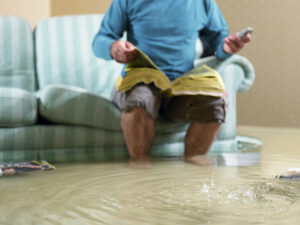
Sump pump backups keep your pump online to prevent unexpected flooding.
Basement flooding is a homeowner’s nightmare, often leading to costly repairs, damage to personal belongings, and mold growth. One of the best defenses against basement flooding is a well-functioning sump pump. However, even the most reliable sump pumps can fail, leading to a flooded basement. To prevent this, understanding how sump pump backups work and implementing preventative measures is crucial.
What Causes Sump Pump Failures?
While sump pumps are designed to divert water away from the foundation of your home, they are not foolproof. Several factors can lead to their failure, including:
- Power Outages: Sump pumps are powered by electricity, making them vulnerable during power outages. Unfortunately, heavy storms that cause flooding often lead to power outages, leaving the pump inoperable when it’s needed most.
- Mechanical Failures: Over time, mechanical components of a sump pump, such as the motor, float switch, or impeller, can wear out or malfunction. Debris or sediment can also clog the pump, impeding its functionality.
- Overwhelmed Sump Pump: During periods of heavy rainfall or rapid snowmelt, the volume of water entering the sump pit may exceed the pump’s capacity, causing it to fail or become overwhelmed.
- Improper Installation: A sump pump that is not installed correctly or is too small for the size of your home’s foundation may fail to effectively manage water accumulation, leading to flooding.
- Frozen or Clogged Discharge Lines: The discharge line, which carries water away from the pump, can become clogged with debris or freeze during cold weather, preventing water from being pumped out.
How to Prevent Sump Pump Backups
The good news is that there are several strategies homeowners can implement to prevent sump pump backups and protect their basements from flooding.
Install a Battery Backup System
The most common cause of sump pump failure is a power outage. Installing a battery backup system ensures that your sump pump will continue to operate during a power outage, preventing water from flooding your basement. Battery backup systems are easy to install and can provide hours of additional pumping power. Some models also come with alarms that notify you if the main pump fails.
Invest in a Water-Powered Backup Pump
Another effective solution for power outages is a water-powered backup pump. These systems use the home’s water pressure to operate, eliminating the need for electricity. While this option is more expensive than a battery backup system, it provides a reliable secondary pumping mechanism that can run indefinitely as long as there is water pressure.
Regularly Inspect and Maintain the Sump Pump
Routine maintenance is essential to ensure your sump pump remains in working order. Check your pump for debris, clogs, and wear and tear at least twice a year—especially before the rainy season. Make sure the float switch moves freely and isn’t obstructed. It’s also a good idea to pour a bucket of water into the sump pit to test the pump and confirm it activates and drains properly.
Ensure Proper Sump Pump Installation
If you’re installing a sump pump for the first time or replacing an old one, make sure it’s properly installed by a professional. The sump pit should be the correct size, and the pump should have the right capacity for your home’s needs. Additionally, the discharge line should be correctly routed away from the home’s foundation to prevent water from flowing back in.
Keep the Discharge Line Clear
Ensure that your sump pump’s discharge line is clear of debris and that it is insulated or buried deep enough to prevent freezing during cold weather. Installing a protective cover or a vented cap on the end of the discharge line can help keep debris and small animals out.
Install an Alarm System
Many sump pumps come with built-in alarms that alert homeowners when the water in the sump pit rises too high or the pump fails. These alarms can notify you early on if there’s a problem, giving you time to take action before flooding occurs. If your pump doesn’t have an alarm, consider purchasing a separate water sensor or flood alarm.
Call Mahon Plumbing Today
If you still have more questions regarding your plumbing, we here at Mahon Plumbing are here to help. We have been serving the wider Baltimore area since 1994, so we have 25 years of experience to back up our fantastic service! Call us at our Baltimore location at 410-766-8566 or our Pasadena location at 410-636-7944. Be sure to keep up with us on social media by following us on Facebook or Twitter.
